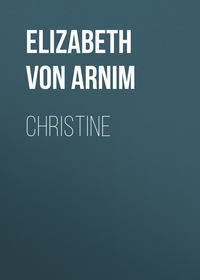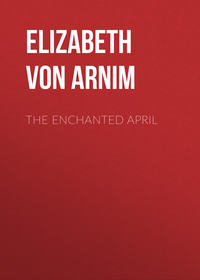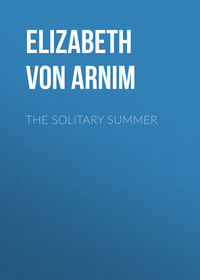 полная версия
полная версияThe Benefactress
There was no mistaking Karlchen's looks; she had not been a pretty girl for several seasons at home in vain. Karlchen meant to marry her. She, of course, did not mean to marry Karlchen, but that did not smooth any of the ruggedness out of the path she saw opening before her. She would have to endure the preliminary blandishments of the wooing, and when the wooing itself had reached the state of ripeness which would enable her to let him know plainly her own intentions, there would be a grievous number of scenes to be gone through with his mother. And then his mother would shake the Kleinwalde dust from her offended feet and go, and failure number one would be upon her. In the innermost recesses of her heart, offensive as Karlchen's wooing would certainly be, she thought that once it was over it would not have been a bad thing; for, since his visit, it was clear that Frau von Treumann was not the sort of inmate she had dreamed of for her home for the unhappy. Unhappy she had undoubtedly been, poor thing, but happy with Anna she would never be. She had forgiven the first fibs the poor lady had told her, but she could not go on forgiving fibs for ever. All those elaborate untruths, written and spoken, about Karlchen's visit, how dreadful they were. Surely, thought Anna, truthfulness was not only a lovely and a pleasant thing but it was absolutely indispensable as the basis to a real friendship. How could any soul approach another soul through a network of lies? And then more painful still—she confessed with shame that it was more painful to her even than the lies—Frau von Treumann evidently took her for a fool. Not merely for a person wanting in intelligence, or slow-witted, but for a downright fool. She must think so, or she would have taken more pains, at least some pains, to make her schemes a little less transparent. Anna hated herself for feeling mortified by this; but mortified she certainly was. Even a philosopher does not like to be honestly mistaken during an entire fortnight for a fool. Though he may smile, he will almost surely wince. Not being a philosopher, Anna winced and did not smile.
"I think," she said to Manske, when he came in one morning with a list of selected applications, "I think we will wait a little before choosing the other nine."
"The gracious one is not weary of well-doing?" he asked quickly.
"Oh no, not at all; I like well-doing," Anna said rather lamely, "but it is not quite—not quite as simple as it looks."
"I have found nine most deserving cases," he urged, "and later there may not be–"
"No, no," interrupted Anna, "we will wait. In the autumn, perhaps—not now. First I must make the ones who are here happy. You know," she said, smiling, "they came here to be made happy."
"Yes, truly I know it. And happy indeed must they be in this home, surrounded by all that makes life fair and desirable."
"One would think so," said Anna, musing. "It is pretty here, isn't it—it should be easy to be happy here,—yet I am not sure that they are."
"Not sure–?" Manske looked at her, startled.
"What do people—most people, ordinary people, need, to make them happy?" she asked wistfully. She was speaking to herself more than to him, and did not expect any very illuminating answer.
"The fear of the Lord," he replied promptly; which put an end to the conversation.
But besides her perplexities about the Chosen, Anna had other worries. Dellwig had received the refusal to let him build the brick-kiln with such insolence, and had, in his anger, said such extraordinary things about Axel Lohm, that Anna had blazed out too, and had told him he must go. It had been an unpleasant scene, and she had come out from it white and trembling. She had intended to ask Axel to do the dismissing for her if she should ever definitely decide to send him away; but she had been overwhelmed by a sudden passion of wrath at the man's intolerable insinuations—only half understood, but sounding for that reason worse than they were—and had done it herself. Since then she had not seen him. By the agreement her uncle had made with him, he was entitled to six months' notice, and would not leave until the winter, and she knew she could not continue to refuse to see him; but how she dreaded the next interview! And how uneasy she felt at the thought that the management of her estate was entirely in the hands of a man who must now be her enemy. Axel was equally anxious, when he heard what she had done. It had to be done, of course; but he did not like Dellwig's looks when he met him. He asked Anna to allow him to ride round her place as often as he could, and she was grateful to him, for she knew that not only her own existence, but the existence of her poor friends, depended on the right cultivation of Kleinwalde. And she was so helpless. What creature on earth could be more helpless than an English girl in her position? She left off reading Maeterlinck, borrowed books on farming from Axel, and eagerly studied them, learning by heart before breakfast long pages concerning the peculiarities of her two chief products, potatoes and pigs.
"He cannot do much harm," Axel assured her; "the potatoes, I see, are all in, and what can he do to the pigs? His own vanity would prevent his leaving the place in a bad state. I have heard of a good man—shall I have him down and interview him for you?"
"How kind you are," said Anna gratefully; indeed, he seemed to her to be a tower of strength.
"Anyone would do what they could to help a forlorn young lady in the straits you are in," he said, smiling at her.
"I don't feel like a forlorn young lady with you next door to help me out of the difficulties."
"People in these lonely country places learn to be neighbourly," he replied in his most measured tones.
He had not again spoken of the Chosen since his walk with her through the forest; and though he knew that Karlchen had been and gone he did not mention his name. Nor did Anna. The longer she lived with her sisters the less did she care to talk about them, especially to Axel. As for Frau von Treumann's plans, how could she ever tell him of those?
And just then Letty, the only being who was really satisfactory, became a cause to her of fresh perplexity. Letty had been strangely content with her German lessons from Herr Klutz. Every day she and Miss Leech set out without a murmur, and came back looking placid. They brought back little offerings from the parsonage, a bunch of narcissus, the first lilac, cakes baked by Frau Manske, always something. Anna took the flowers, and ate the cakes, and sent pleased messages in return. If she had been less preoccupied by Dellwig and the eccentricities of her three new friends, she would certainly have been struck by Letty's silence about her lessons, and would have questioned her. There was no grumbling after the first day, and no abuse of Schiller and the muses. Once Anna met Klutz walking through Kleinwalde, and asked him how the studies were progressing. "Colossal," was the reply, "the progress made is colossal." And he crushed her rings into her fingers when she gave him her hand to shake, and blushed, and looked at her with eyes that he felt must burn into her soul. But Anna noticed neither his eyes nor his blush; for his eyes, whatever he might feel them to be doing, were not the kind that burn into souls, and he was a pale young man who, when he blushed, did it only in his ears. They certainly turned crimson as he crushed Anna's fingers, but she was not thinking of his ears.
"Frau Manske is too kind," she said, as the nosegays, at first intermittent, became things of daily occurrence. They grew bigger, too, every day, attaining such a girth at last that Letty could hardly carry them. "She must not plunder her garden like this."
"It is very full of flowers," said Miss Leech. "Really a wonderful display. The bunch is always ready, tied together and lying on the table when we arrive. I tried to tell her yesterday that you were afraid she was spoiling her garden, sending so much, but she did not seem to understand. She is showing me how to make those cakes you said you liked."
"I wish I had some of these in my garden," said Anna, laying her cheek against the posy of wallflowers Letty had just given her. There was nothing in her garden except grass and trees; Uncle Joachim had not been a man of flowers.
She took them up to her room, kissing them on the way, and put them in a jar on the window-sill; and it was not until two or three days later, when they began to fade, that she saw the corner of an envelope peeping out from among them. She pulled it out and opened it. It was addressed to Ihr Hochwohlgeboren Fräulein Anna Estcourt; and inside was a sheet of notepaper with a large red heart painted on it, mangled, and pierced by an arrow; and below it the following poem in a cramped, hardly readable writing:—
The earth am I, and thou the heaven,The mass am I, and thou the leaven,No other heaven do I want but thee,Oh Anna, Anna, Anna, pity me!August Klutz, Kandidat.In an instant Letty's unnatural cheerfulness about her lessons flashed across her. What had they been doing, and where was Miss Leech, that such things could happen?
It was a very terrible, stern-browed aunt who met Letty that day on the stairs when she came home.
"Hullo, Aunt Anna, seen a ghost?" Letty inquired pleasantly; but her heart sank into her boots all the same as she followed her into her room.
"Look," said Anna, showing her the paper, "how could you do it? For of course you did it. Herr Klutz doesn't speak English."
"Doesn't he though—he gets on like anything. He sits up all night–"
"How is it that this was possible?" interrupted Anna, striking the paper with her hand.
"It's pretty, isn't it," said Letty, faintly grinning. "The last line had to be changed a little. It isn't original, you know, except the Annas. I put in those. That footman mother got cheap because he had one finger too few sent it to Hilton on her birthday last year—she liked it awfully. The last line was 'Oh Hilton, Hilton, Hilton–'"
"How came you to talk such hideous nonsense with Herr Klutz, and about me?"
"I didn't. He began. He talked about you the whole time, and started doing it the very first day Leechy cooked."
"Cooked?"
"She is always in the kitchen with Frau Manske. We brought you some of the cakes one day, and you seemed as pleased as anything."
"And instead of learning German you and he have been making up this sort of thing?"
Anna's voice and eyes frightened Letty. She shifted from one foot to the other and looked down sullenly. "What's the good of being angry?" she said, addressing the carpet; "it's only Mr. Jessup over again. Leechy wasn't angry with Mr. Jessup. She was frightfully pleased. She says it's the greatest compliment a person can pay anybody, going on about them like Herr Klutz does, and talking rot."
Anna stared at her, bewildered. "Mr. Jessup?" she repeated. "And do you mean to tell me that Miss Leech knows of this—this disgusting nonsense?" She held the mangled heart at arm's length, crushing it in her hand.
"I say, you'll spoil it. He worked at it for days. There weren't any paints red enough for the wound, and he had to go to Stralsund on purpose. He thought no end of it." And Letty, scared though she was, could not resist giggling a little.
"Do you mean to tell me that Miss Leech knows about this?" insisted Anna.
"Rather not. It's a secret. He made me promise faithfully never to tell a soul. Of course it doesn't matter talking to you, because you're one of the persons concerned. You can't be married, you know, without knowing about it, so I'm not breaking my promise talking to you–"
"Married? What unutterable rubbish have you got into your head?"
"That's what I said—or something like it. I said it was jolly rot. He said, 'What's rot?' I said 'That.'"
"But what?" asked Anna angrily. She longed to shake her.
"Why, that about marrying you. I told him it was rot, and I was sure you wouldn't, but as he didn't know what rot was, it wasn't much good. He hunted it out in the dictionary, and still he didn't know."
Anna stood looking at her with indignant eyes. "You don't know what you have done," she said, "evidently you don't. It is a dreadful thing that the moment Miss Leech leaves you you should begin to talk of such things—such horrid things—with a stranger. A little girl of your age–"
"I didn't begin," whimpered Letty, overcome by the wrath in Anna's voice.
"But all this time you have been going on with it, instead of at once telling Miss Leech or me."
"I never met a—a lover before—I thought it—great fun."
"Then all those flowers were from him?"
"Ye—es." Letty was in tears.
"He thought I knew they were from him?"
No answer.
"Did he?" insisted Anna.
"Ye—es."
"You are a very wicked little girl," said Anna, with awful sternness. "You have been acting untruths every day for ages, which is just as bad as telling them. I don't believe you have an idea of the horridness of what you have done—I hope you have not. Of course your lessons at Lohm have come to an end. You will not go there again. Probably I shall send you home to your mother. I am nearly sure that I shall. Go away." And she pointed to the door.
That night neither Letty nor Miss Leech appeared at supper; both were shut up in their rooms in tears. Miss Leech was quite unable to forgive herself. It was all her fault, she felt. She had been appalled when Anna showed her the heart and told her what had been going on while she was learning to cook in Frau Manske's kitchen. "Such a quiet, respectable-looking young man!" she exclaimed, horror-stricken. "And about to take holy orders!"
"Well, you see he isn't quiet and respectable at all," said Anna. "He is unusually enterprising, and quite without morals. Only a demoralised person would take advantage of a poor little pupil in that way."
She lit a candle, and burnt the heart. "There," she said, when it was in ashes, "that's the end of that. Heaven knows what Letty has been led into saying, or what ideas he has put into her head. I can't bear to think of it. I hadn't the courage to cross-question her much—I was afraid I should hear something that would make me too angry, and I'd have to tell the parson. Anyhow, dear Miss Leech, we will not leave her alone again, ever, will we? I don't suppose a thing like this will happen twice, but we won't let it have a chance, will we? Now don't be too unhappy. Tell me about Mr. Jessup."
It was Miss Leech's fault, Anna knew; but she so evidently knew it herself, and was so deeply distressed, that rebukes were out of the question. She spent the evening and most of the night in useless laments, while, in the room adjoining, Letty lay face downwards on her bed, bathed in tears. For Letty's conscience was in a grievous state of tumult. She had meant well, and she had done badly. She had not thought her aunt would be angry—was she not in full possession of the facts concerning Mr. Jessup's courtship? And had not Miss Leech said that no higher honour could be paid to a woman than to fall in love with her and make her an offer of marriage? Herr Klutz, it is true, was not the sort of person her aunt could marry, for her aunt was stricken in years, and he looked about the same age as her brother Peter; besides, he was clearly, thought Letty, of the guttersnipe class, a class that bit its nails and never married people's aunts. But, after all, her aunt could always say No when the supreme moment arrived, and nobody ought to be offended because they had been fallen in love with, and he was frightfully in love, and talked the most awful rot. Nor had she encouraged him. On the contrary, she had discouraged him; but it was precisely this discouragement, so virtuously administered, that lay so heavily on her conscience as she lay so heavily on her bed. She had been proud of it till this interview with her aunt; since then it had taken on a different complexion, and she was sure, dreadfully sure, that if her aunt knew of it she would be very angry indeed—much, much angrier than she was before. Letty rolled on her bed in torments; for the discouragement administered to Klutz had been in the form of poetry, and poetry written on her aunt's notepaper, and purporting to come from her. She had meant so well, and what had she done? When no answer came by return to his poem hidden in the wallflowers, he had refused to believe that the bouquet had reached its destination. "There has been treachery," he cried; "you have played me false." And he seemed to fold up with affliction.
"I gave it to her all right. She hasn't found the letter yet," said Letty, trying to comfort, and astonished by the loudness of his grief. "It's all right—you wait a bit. She liked the flowers awfully, and kissed them."
"Poor young lover," she thought romantically, "his heart must not bleed too much. Aunt Anna, if she ever does find the letter, will only send him a rude answer. I will answer it for her, and gently discourage him." For if the words that proceeded from Letty's mouth were inelegant, her thoughts, whenever they dwelt on either Mr. Jessup or Herr Klutz, were invariably clothed in the tender language of sentiment.
And she had sat up till very late, composing a poem whose mission was both to discourage and console. It cost her infinite pains, but when it was finished she felt that it had been worth them all. She copied it out in capital letters on Anna's notepaper, folded it up carefully, and tied it with one of her own hair-ribbons to a little bunch of lilies-of-the-valley she had gathered for the purpose in the forest.
This was the poem:—
It is a matter of regretThat circumstances won'tAllow me to call thee my pet,But as it is they don't.For why? My many years forbid,And likewise thy position.So take advice, and strive amidThy tears for meek submission.Anna.And this poem was, at that very moment, as she well knew, in Herr Klutz's waistcoat pocket.
CHAPTER XXII
The ordinary young man, German or otherwise, hungrily emerging from boyhood into a toothsome world made to be eaten, cures himself of his appetite by indulging it till he is ill, and then on a firm foundation of his own foolish corpse, or, as the poet puts it, of his dead self, begins to build up the better things of his later years.
Klutz was an ordinary young man, and arrived at early manhood as hungry as his fellows; but his father was a parson, his grandfather had been a parson, his uncles were all parsons, and Fate, coming cruelly to him in the gloomy robes of the Lutheran Church, his natural follies had had no opportunity of getting out, developing, and dissolving, but remained shut up in his heart, where they amused themselves by seething uninterruptedly, to his great discomfort, while the good parson, in whose care he was, talked to him of the world to come.
"The world to come," thought Klutz, hungering and thirsting for a taste of the world in which he was, "may or may not be very well in its way; but its way is not my way." And he listened in a silence that might be taken either for awed or bored to Manske's expatiations. Manske, of course, interpreted it as awed. "Our young vicar," he said to his wife, "thinks much. He is serious and contemplative beyond his years. He is not a man of many and vain words." To which his wife replied only by a sniff of scepticism.
She had no direct proofs that Klutz was not serious and contemplative, but during his first winter in their house he had fallen into her bad graces because of a certain indelicately appreciative attitude he displayed towards her apple jelly. Not that she grudged him apple jelly in just quantities; both she and her husband were fond of it, and the eating of it was luckily one of those pleasures whose indulgence is innocent. But there are limits beyond which even jelly becomes vicious, and these limits Herr Klutz continually overstepped. Every autumn she made a sufficient number of pots of it to last discreet appetites a whole year. There had always been vicars in their house, and there had never been a dearth of jelly. But this year, so early as Easter, there were only two pots left. She could not conveniently lock it up and refuse to produce any, for then she and her husband would not have it themselves; so all through the winter she had watched the pots being emptied one after the other, and the thinner the rows in her storeroom grew, the more pronounced became her conviction that Klutz's piety was but skin deep. A young man who could behave in so unbridled a fashion could not be really serious; there was something, she thought, that smacked suspiciously of the flesh and the devil about such conduct. Great, then, was her astonishment when, the penultimate pot being placed at Easter on the table, Klutz turned from it with loathing. Nor did he ever look at apple jelly again; nor did he, of other viands, eat enough to keep him in health. He who had been so voracious forgot his meals, and had to be coaxed before he would eat at all. He spent his spare time writing, sitting up sometimes all night, and consuming candles at the same head-long rate with which he had previously consumed the jelly; and when towards May her husband once more commented on his seriousness, Frau Manske's conscience no longer permitted her to sniff.
"You must be ill," she said to him at last, on a day when he had sat through the meals in silence and had refused to eat at all.
"Ill!" burst out Klutz, whose body and soul seemed both to be in one fierce blaze of fever, "I am sick—sick even unto death."
And he did feel sick. Only two days had elapsed since he had received Anna's poem and had been thrown by it into a tumult of delight and triumph; for the discouragement it contained had but encouraged him the more, appearing to be merely the becoming self-depreciation of a woman before him who has been by nature appointed lord. He was perfectly ready to overlook the obstacles to their union to which she alluded. She could not help her years; there were, truly, more of them than he would have wished, but luckily they were not visible on that still lovely face. As to position, he supposed she meant that he was not adelig; but a man, he reflected, compared to a woman, is always adelig, whatever his name may be, by virtue of his higher and nobler nature. He had been for rushing at once to Kleinwalde; but his pupil and confidant had said "Don't," and had said it with such energy that for that day at least he had resisted. And now, the very morning of the day on which the Frau Pastor was asking him whether he were ill, he had received a curt note from Miss Leech, informing him that Miss Letty Estcourt would for the present discontinue her German studies. What had happened? Even the poem, lying warm on his heart, was not able to dispel his fears. He had flown at once to Kleinwalde, feeling that it was absurd not to follow the dictates of his heart and cast himself in person at Anna's no doubt expectant feet, and the door had been shut in his face—rudely shut, by a coarse servant, whose manner had so much enraged him that he had almost shown her the precious verses then and there, to convince her of his importance in that house; indeed, the only consideration that restrained him was a conviction of her ignorance of the English tongue.
"Would you like to see the doctor?" inquired Frau Manske, startled by his looks and words; perhaps he had caught something infectious; an infectious vicar in the house would be horrible.
"The doctor!" cried Klutz; and forthwith quoted the German rendering of the six lines beginning, Canst thou not minister to a mind diseased.
Frau Manske was seriously alarmed. Not aware that he was quoting, she was horrified to hear him calling her Du, a privilege confined to lovers, husbands, and near relations, and asking her questions that she was sure no decent vicar would ever ask the respectable mother of a family. "I am sure you ought to see the doctor," she said nervously, getting up hastily and going to the door.
"No, no," said Klutz; "the doctor does not exist who can help me."
His hand went to the breast-pocket containing the poem, and he fingered it feverishly. He longed to show it to Frau Manske, to translate it for her, to let her see what the young Kleinwalde lady, joint patron with Herr von Lohm of her husband's living, thought of him.
"I will ask my husband about the doctor," persisted Frau Manske, disappearing with unusual haste. If she had stayed one minute longer he would have shown her the poem.









